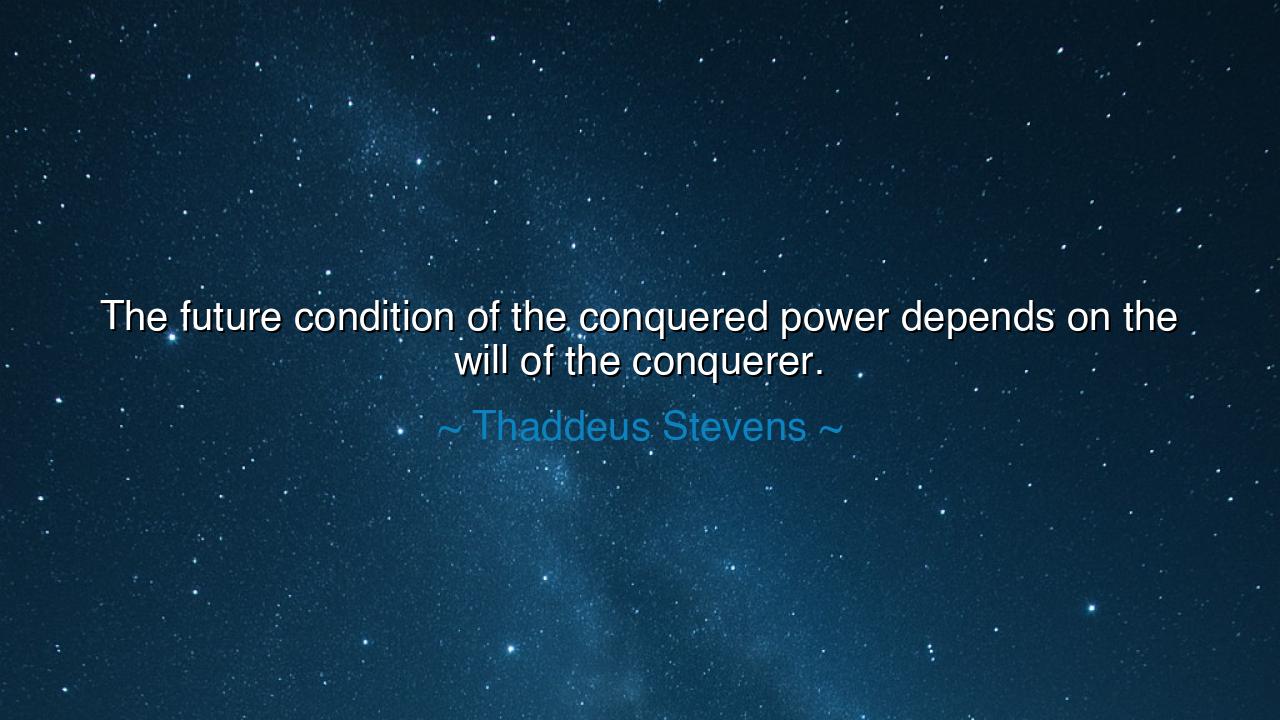
The future condition of the conquered power depends on the will






Hear now, O Seekers of Wisdom, the words of Thaddeus Stevens, which echo with the weight of history and the understanding of power. He said, "The future condition of the conquered power depends on the will of the conqueror." This truth, though spoken in the heat of a moment in the struggle for justice, speaks to the timeless nature of domination, subjugation, and the forces that shape the destinies of nations and peoples. The conqueror holds within their grasp not only the power to defeat, but to decide the fate of the vanquished, for it is in the hands of the strong that the future is forged.
To understand the meaning of Stevens’ words, we must look to the nature of power and dominance. When a nation or people is conquered, when their will is broken and their strength diminished, their future no longer lies solely in their own hands. The will of the conqueror dictates what is to come—whether the conquered will be enslaved, absorbed, or allowed to retain some semblance of autonomy. Stevens’s words remind us that the consequences of defeat are not determined by the defeated, but by the victor, and that this power is absolute, unyielding, and often irreversible.
In the ancient world, the most powerful empires understood this well. Consider the mighty Roman Empire, which conquered vast territories and brought under its dominion people of many different cultures. When Rome triumphed, it was not simply a matter of military victory, but of determining the future of those it conquered. The Gauls, the Jews, the Egyptians—all were subject to the will of Rome. For some, this meant the complete loss of identity and culture; for others, it meant the imposition of Roman laws, religion, and customs. But in every case, the conquered power was left to face the will of the victors, who shaped the future according to their own desires.
Yet, there is another layer to Stevens’s observation. The nature of the conqueror matters just as much as the act of conquest. The will of the conqueror can either destroy or uplift. Consider the example of Alexander the Great, who, though he conquered vast territories and defeated many great empires, sought not to crush the cultures he conquered but to blend them with his own vision. He married Persian royalty, adopted Persian customs, and encouraged cultural exchange across his empire. Alexander understood that the future of a conquered people depended not only on the will to dominate, but on the wisdom of how that domination was exercised. His will to conquer was tempered with a vision of unity and strength, and in this, he created a legacy that lasted far beyond his death.
Contrast this with the actions of other conquerors, who sought only to subjugate and destroy. Genghis Khan, for example, was a conqueror whose will was marked by brutality and destruction. His empire spanned much of Asia, and his legacy is one of terror for those who resisted him. Yet, in the end, his empire fragmented after his death, and the harshness of his rule left a legacy of fear and division. The future of the conquered powers in Genghis Khan’s empire was not one of cooperation or cultural blending, but of oppression and suffering. In his case, the will of the conqueror led to division, not unity, and the empire he built was fractured by the very cruelty that marked its foundation.
Stevens’s words hold a deeper lesson: the will of the conqueror is not just a force of destruction, but a force that shapes the future of civilizations. The conqueror’s actions define whether the conquered will rise again, whether they will contribute to the world’s progress, or whether they will remain silent, forgotten. The future of a nation, a people, or a culture, therefore, lies not just in their ability to resist or recover, but in the vision of those who hold the power to shape it. Whether the conqueror is a tyrant or a visionary, their decisions will echo through time.
Thus, O Seekers, let us learn from the wisdom of Stevens. In our own lives, we too face moments of domination—whether in personal struggles, societal forces, or in the challenges of leadership. The choices we make in these moments will shape the future not only for ourselves, but for those around us. The will we exercise, whether as rulers of our own destinies or as leaders of others, has the power to uplift or to crush, to unite or to divide. Like Alexander, let us strive to be conquerors who build bridges, who temper our strength with wisdom, and who shape the future with a vision of hope. Let us not be mere tyrants, but wise rulers, knowing that the future of those we lead depends on the will we choose to exercise today.






AAdministratorAdministrator
Welcome, honored guests. Please leave a comment, we will respond soon